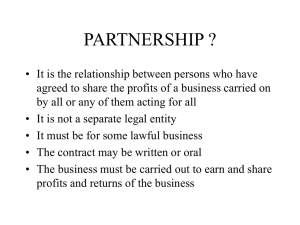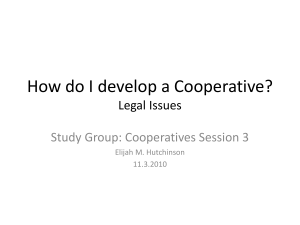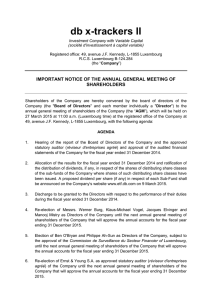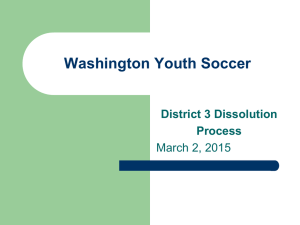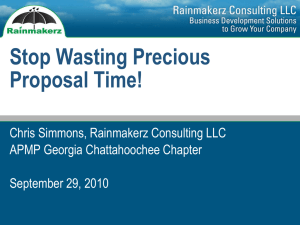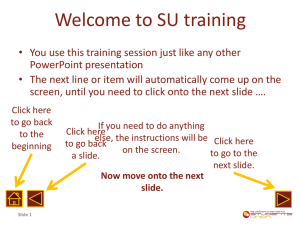Business Breakups: Breaking Up is Hard to Do
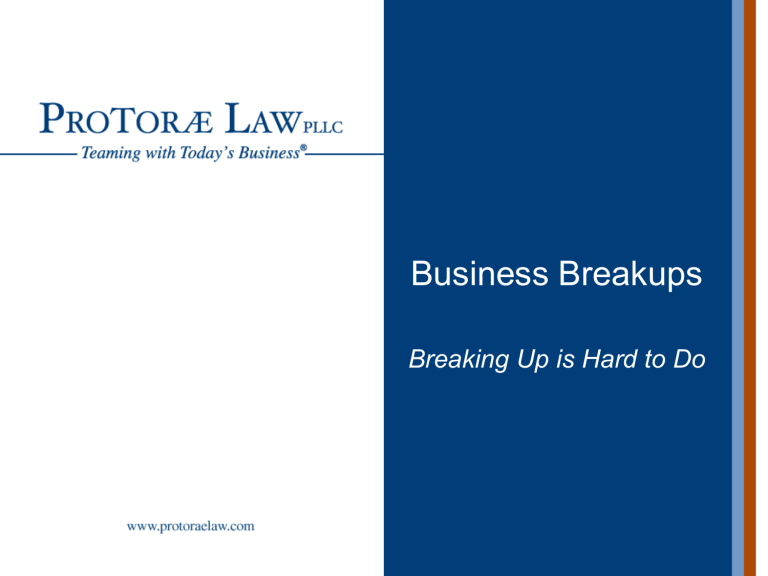
Business Breakups
Breaking Up is Hard to Do
2
Disclaimer
• The information contained in this presentation is provided for informational purposes only. It should not be interpreted as legal advice for any purpose or on any issue or subject. You should always obtain the advice of an attorney in a proper jurisdiction. No use of this presentation or the information will create an attorney-client relationship or other relationship of any nature between Protorae Law,
PLLC and you. You should not act or decide not to act in reliance on this presentation.
• This presentation is a summary of the law and should not be viewed as a comprehensive description of the law.
3
4
Types of Business Relationships
• Corporations
• Limited Liability Companies
– Professional Limited Liability
Companies
• Partnerships
• Joint Ventures
• Contractual
• Favors
5
Sources of Governing Law
• Businesses are “ Creatures of State Statutes ”
• Virginia Statutes
– Title 13.1 Corporate Code
• Common Law
– Governs internal and external conduct
• e.g., fiduciary duty, piercing corporate veil
• Federal Laws
– SDVOSB
• Contractual
• Morals
6
Typical Scenarios
• Business Owners in Conflict
– Majority vs. Minority
– Deadlocks
• Disputes Over Ownership
• Minority Squeeze Outs
• Improper Spin-Off Businesses
7
Common Traits in Business Breakups
• High stakes and emotional
– Survival of existing company
– Former owners’ right to compete in chosen field
• Greed often a factor
8
Shaky Foundations
• “ Back of the Envelope ” Agreements
• Overly complicated agreements
– No one understands it and/or contrary to “actual” deal
• No written agreement
• Verbal Promises by Owner to provide employee ownership interest
9
“Back of the Envelope”
• Usually Not drafted by an Attorney
– Often downloaded from the Internet
• Minimal terms
• Often 50/50 or other equal ownership split
• Most terms need to be filled-in
– Conduct
– Other writings, e.g. emails, memos
• Often messy and disparate finances
10
Overly Complex Agreements
• Drafted by or adopted from an Attorney
• Little understood by Owners
• Often mismatch between terms and conduct
• More likely to have blend of monetary and sweat equity
• Broad contractual overlay of rights and obligations
– Dissolution and Wind-Up terms usually included
11
No Written Contract
• Hodge-podge of Terms
– Pre- and Post-agreement conduct and writings must be interpreted
– Straight lines are hard to find
• Inconsistencies abound
• Different historic narratives and “facts”
• Statutes Dominant
12
Ownership Promises
• Verbal promises by owner to provide employee ownership interest
– Offered to existing employee in exchange for:
• Working for less or free, investing money, staying on rather than starting own company
• Promises to Friend, Neighbor, or Relative
– To begin working at company because can’t afford to pay that person
13
Ownership Promises
• Raw emotions are a given
– Both parties feel betrayed
• Money usually follows paper
• Self-Help prevalent
– Bank accounts manipulated
– Client contact
– Employee contacts
– Access to office
Virginia Statutes
• Different for Corporations, Partnerships and LLCs
• Differences Matter in Corporate Disputes and Breakups
14
15
Federal Laws
• Special Set-Asides
• Minority Owned
• Woman Owned
• Service Disabled Veteran Owned (SDVOs)
• Require “Management Control”
Dissolution of Corporation - Voluntary
• Corporation’s Board may propose dissolution to shareholders
• For proposal to be adopted:
– Board recommends dissolution to shareholders unless
Board is conflicted
– Shareholders entitled to vote to approve the proposal
• 2/3’s vote unless Articles of Corporation state otherwise
Corporate Judicial Dissolution- Process
• How the Process Happens
– Suit filed by shareholder in state circuit court
– The court may appoint a receiver or custodian pendente lite to take control of and protect corporate assets
– It is not necessary to make the directors or shareholders parties to the case unless there are claims against the directors
Grounds For Judicial Dissolution of Corp.
• Directors deadlocked and irreparable injury
• Directors actions “illegal, oppressive, or fraudulent.”
– Shareholders are deadlocked, fail to elect successor board, or
– Corporate assets misapplied or wasted.
19
Dissolution Causes of Action
• Breach of Fiduciary Duty
• Misappropriation of Trade Secrets
• Tortious Interference with Contract or Business
Expectancy
• Business Conspiracy
• Fraud
20
Contract vs. Tort
• Contract : Enforceable Agreement
– Contract remedy is exclusive if only duty is contractual
– Damages: benefits reasonably foreseeable at time contract was made
• Tort : Extra Contractual Duties
– Violation of common law and statutory duties imposed to protect society
– Damages: all losses suffered
Good Faith/Fair Dealing in Contracts
• Virginia and Maryland
– Not a Separate Cause of Action
• District of Columbia
– Separate Cause of Action
– Right of parties to receive the fruits of the contract
– Underlying Contract Required
• But written contract not required
21
22
Election to Purchase Shareholders’ Shares
• During dissolution, the corporation, or the shareholders, may elect to purchase shares at
“fair value”
• “Fair Value” calculation is from the day before which the petition filed
– Court has the power to change that date
• Election is irrevocable
23
“Fair Value” of Shares
• Agree on “Fair Value”
• If no agreement, the court may select appraiser
• The court may allocate cost of appraiser
• Court may hold a hearing on the value
Valuation Standards
• Fair Market Value
– Discounts can be taken for lack of marketability and minority interests (lack of control)
• Fair Value
– No discounts
• Discounts can be significant
24
25
How the Purchase of Shares Occurs
• After “ Fair Value ” determined the court directs the purchase on “appropriate” terms
– Installment sale
– Interest included “if equitable”
26
Dissolution of Limited Liability Companies
• LLC is dissolved when:
– Any event triggering a dissolution under the LLC operating agreement occurs;
– Upon unanimous members consent
• Court entry of a decree of dissolution;
• Automatic cancellation of the LLC existence by SCC (for failure to maintain a registered agent, office, etc.)
27
Judicial Dissolution of LLC
• Upon a Member’s application, the court may decree dissolution “if it is not reasonably practicable to carry on the business in conformity with the articles of organization and any operating agreement.”
• After LLC winds up, the court will advise the
SCC, which enters an order of cancellation.
28
Winding up an LLC
• “ All debts, liabilities, and obligations” need to be paid and discharged an “reasonably adequate provision” has been made, and all remaining property and assets of the LLC have been distributed to its members.
• The members are responsible for winding up the LLC, but, upon the application of any member the court may appoint a
“liquidating trustee” to handle the wind up
• A “liquidating trustee” may:
– Prosecute any suits on behalf of the LLC
– Wind up the LLC’s business
–
Dispose of and convey LLC property
– Discharge or make reasonable provision for LLC’s liabilities
–
Wind up known claims against LLC
– Distribute to the members of any remaining assets
Priority of Payment of Dissolved LLC’s Assets
• First , to all creditors of the LLC, including all members who are creditors
• Second , to any members in satisfaction of liabilities for distributions
• Lastly , to members in return for their contributions and second in respect to their interests in the LLC
29
30
Unanimous Consent Clauses
• Unanimous consent agreements can cause problems
• If one member breaches fiduciary duty, LLC may be unable to agree to sue offending member
• Previously no Virginia law on point
• Recent Virginia case redefined a LLC’s unanimous consent requirement to permit the
LLC to sue one of its members. Infinite Design
Electric Assoc. LLC, et al. v. Donald R. Hague ,
2010 Va. Cir. LEXIS 27 (Fairfax Cir. Ct. 2010).
31
Infinite Design Case
32
Infinite Design Case (Continued)
33
Other Issues
34
Judicial Dissolution of Limited Partnership
• Similar to LLC: “if it is not reasonably practicable to carry on the business in conformity with the partnership agreement.”
• After winding up, the court advises the SCC which enters a cancellation order
Process of Dissolution for Limited Partnerships
• Similar to LLCs, but the winding up is by the general partner who has not
“wrongfully dissolved a limited partnership.”
• If no general partner, then the limited partners, or a person approved by the limited partners
• Court may appoint a
“liquidating trustee”
35
36
A Partnership is Dissolved When
• Upon notice of partner’s intent to withdraw as a partner;
• Dissolution event occurs under the partnership agreement;
• Partner’s expulsion pursuant to the partnership agreement;
• Partner’s expulsion by the unanimous vote of the other partners if:
– It is unlawful to carry on the partnership business with that partner; or
– There has been a transfer of all or substantially all of that partner’s transferable interest in the partnership which has not been foreclosed
• On application by the partnership or another partner, the partner’s expulsion because :
– Wrongful conduct that adversely affected the partnership business;
–
Material breach of the partnership agreement or a duty owed to the partnership or breached the statutory standards of partnership conduct; or
– Conduct that makes it not reasonably practicable to carry on the business in partnership with the partner
• Certain events relating to a partner becoming a debtor in bankruptcy;
• Death, guardianship, or incapacity
37
The Power of Partners to Dissociate
• Partner can dissociate at any time, rightfully or wrongfully, by “express will”
• Dissociation is only wrongful if:
– The dissociation breaches the partnership agreement; or
– Expiration of the defined partnership term or completion of the defined undertaking
38
What if the Dissociation is “Wrongful”?
• Partner is liable to the partnership and to the other partners for:
– Damages caused by the dissociation
– Partner’s other obligations
39
Effect of the Partner’s Dissociation
• Terminates right to participate in the management and conduct of the partnership except right to wind up
• Duty of loyalty terminates;
• Duty of care continues only with regard to events occurring before the partner’s dissociation, unless winding up
40
Purchase of Dissociated Partner’s Interest
• Partnership can purchase the interest of dissociated partner
• Buyout price is based on the amount that would have been distributable if, on the date of dissociation the assets of the partnership were sold at a price equal to the greater of either:
– Liquidation value of the partnership or;
– The value of the partnership based on a sale of the entire business as a going concern without the dissociated partner
41
Purchase of Dissociated Partner’s Interest
• If the Dissociation was “Wrongful”
– Damages for wrongful dissociation and other amounts owing are offset from buyout price
• If the Dissociation Occurs Prior to the expiration of a definite term or occurrence?
• No payment of any portion of the buyout until the expiration of the term or completion of the undertaking.
42
Indemnity Provisions
• Upon the buyout, the partnership indemnifies against all partnership liabilities
• Except liabilities caused by an act of the dissociated partner
Right to Review Records-Stock Corporation Act
• Limited right of shareholders to review records:
– Articles of incorporation and any amendments
– Bylaws or restated bylaws and all amendments
– Resolutions creating classes of shares or fixing the relative rights and preferences of the various classes.
– Minutes of all shareholders meetings and all records of all action taken by shareholders without a meeting, for the past 3 years.
– Written communications to shareholders within the past 3 years
– List of names and business addresses of current directors and officers
– Most recent annual report delivered to the SCC
43
Rights to Review Records-Stock Corp. Act
• Shareholders who meet 6-month or 5% test and makes a “good faith” demand with “proper purpose” may review:
– Excerpts from minutes of any meeting of the board of directors
– Accounting records of the corporation
– Record the shareholders of record
44
45
Right to Review Records-Partnership
• Must “provide partners and their agents and attorneys access to its books and records.”
46
Right to Review Records – LLC Act
• Each member has the right to inspect and copy all records which the LLC must legally maintain
– operating agreements, tax returns, articles of organization, a current list of all members and their business addresses
• A member may also inspect and copy all
– “true and full information regarding the state of the business and financial condition of the LLC;”
– And all other information regarding the affairs of the LLC
• But may be restricted by the LLC’s operating agreement
47
Fiduciary Duties
What Fiduciary Duties Are Owed?
• No Self-Dealing
• No Misuse of Proprietary Data
• No Misappropriation of Trade Secrets
• No Solicitation of Customers Prior to
Termination of Employment
48
Intra-Corporate Disputes
What Fiduciary Duties Are Owed?
• Employee Related Duties
– Limited Solicitation of Employees Prior to Termination of Employment?
• Contours Not Well Defined
– No Planning for Mass Resignation
49
Intra-Corporate Disputes
• Who Owes Fiduciary Duties to Whom?
– Officers, directors
• Duty to shareholders as a class
• Duty of loyalty to corporation
– Employees
• Duty of loyalty to corporation
– LLC Members
• Owe duties to LLC
• No duty to one another
– Shareholders
• No duty to one another
• Majority no duty to minority
• Generally no fiduciary obligations of minority shareholders toward the corporation, absent officer or director status
Intra-Corporate Disputes
50
• Defenses
–
Business Judgment Rule
• Presumption that directors acted on informed basis in the company’s best interest
• Exception : fraud, bad faith or self-dealing
– burden shifts to show transaction was fair
• If majority shareholder(s) act within their rights, then motives or ill will are of no consequence
51
Hypothetical Fact Patterns
52
Hypothetical
• Minority and majority shareholders disagree
• Minority locks out majority shareholder from office based upon an “investigation”
• Transfers money to new account
• Management team forms new company to create “safe haven” for company’s clients
53
Hypothetical
• Company out of money
• Company verbally promises employee 50-50 share in exchange for $350,000 loan from employee
• No written agreement
• Company subsequently refers to employee as
“partner” and “president,” give signing and negotiating authority
• Corporate books and records are not updated to reflect the change
• Approx. 6 years later, company terminates the employee
54
Electronic Discovery
• Damaging E-Mails almost always exist
• Less formal dialogue
• Patterns usually emerge
• Numerous Sources :
– E-mails
– Text Messages
– Phone Records
– Calendars
Electronic Discovery
• Destruction of Electronic Docs
– Preservation obligations
– Timing of destruction important
– Sanctions Available
• Adverse Inference
• Evidence Preclusion
• Default Judgment
• Monetary Sanctions
55
56
Introduction to Team
• Cross-Disciplinarian
– Employment
– Corporate
– Intellectual Property
– Government Contracts
– Commercial Litigation
• Attorneys Experienced in Business Breakups
57
Brian F. Chandler
Protorae Law, PLLC
Business Breakups Practice Team
Tysons Corner, VA
703.749.6019
bchandler@protoraelaw.com
James B. Kinsel
Protorae Law, PLLC
Business Breakups Practice Team
Tysons Corner, VA
703.749.6023
jkinsel@protoraelaw.com
Web site: www.protoraelaw.com
Blog: http://www.protoraelaw.com/Blogs.aspx

